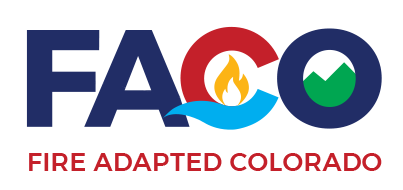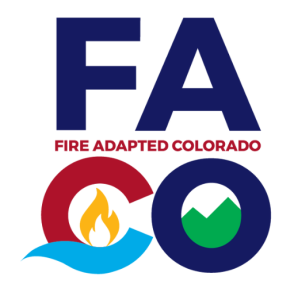Each survivor’s story is powerful with its own challenges. FACO wishes for the many people still putting their lives back together to find solace this holiday season, wherever you are. While one recent 9News story highlights Neighbors who lost homes in Marshall Fire break ground on new houses together, there are ongoing challenges with permitting, insurance, still standing homes inundated with toxic smoke that remain unsafe for owners or renters to move back into, and the heavy emotional toll of witnessing and experiencing such losses for fire survivors and responders everywhere, not just from the Marshall Fire.
Hope is in the Air
Beds of coals and post-fire debris flows form the foundations of many wildfire resilience programs and organizations. Some homes are being rebuilt and here you’ll find more hope through the resources and proactive stories around Colorado. Our view from Fire Adapted Colorado’s eyes on the state is of persistent work leading Colorado closer to a future when homes and lives are not destroyed by wildfires.
As the Boulder area approaches the one-year anniversary of the Marshall Fire, demand for wildfire resilience information and programs is expanding in urban areas, grasslands and among open space managers. FACO is excited to have a Training Specialist on staff who is supporting efforts of the grasslands work-group of the Boulder County Fireshed Collaborative and who is planning a Building Your Fire Adapted Communities Neighborhood Ambassador approach workshop in Boulder at the end of February.
Funding Advancements
Recovery funds and programs, private foundation investment in proactive efforts, and passage of Boulder County Ballot Measure 1A will financially support efforts to meet this demand. The development of the CO Strategic Wildfire Action Program, expansion of the Forest Restoration and Wildfire Risk Mitigation grant program, and an infusion of federal funds through the Bipartisan Infrastructure Law are increasing capacity throughout the state.
Structure Ignition Science
Science continues to advance. Researchers are publishing helpful studies, reports, and guides furthering the understanding of structure ignition hazards. The National Institute of Science and Technology investigated how fences ignite and spread wildfires to other structures and this 9News story reflects specifically on fences and the structure ignition zone during the Marshall Fire.
The Insurance Institute of Business and Home Safety launched the Wildfire Prepared Home program in California and plans to bring it to Colorado, emphasizing homeowners’ abilities to assess and remove hazards in their structure ignition zones.
The Southern Rockies Fire Science Network regularly shared these and other timely and relevant scientific findings through their e-newsletter.
Partners
In Colorado, we all turn to the Colorado State Forest Service for guidance and support. CSFS updated standards and guidance for Community Wildfire Protection Plans this year. The Division of Fire Prevention and Control also had a breakthrough in their ability to perform fuels management work on private lands.
Less traditional partners in the wildfire mitigation arena are emerging. Open space managers and land trusts are increasingly identifying their roles to prepare for wildfires. Several FACO members presented at the Colorado Open Space Alliance conference this fall. The West Region Wildfire Council recently completed a 140 acre fuel treatment in a critical landscape on a property held in conservation easement with the Colorado Land Trust.
The insurance Industry has been a long standing partner in supporting wildfire risk reduction. For those dealing directly with insurance claims, United Policyholders is a nonprofit advocacy organization for all policyholders with great resources. They provide support from claims and finding insurance when you’ve been dropped, to preparing a home inventory and purchasing adequate insurance. The Rocky Mountain Insurance Information Association has many great resources to help with policy understanding and proactive actions policyholders can take to reduce losses. A couple of great actions highlighted in this brand new Winter Months Wildfire Messaging document put together by Eagle County include conducting a home inventory and an insurance check up.
Connecting Through Fire Adapted Colorado
In addition to adding staff capacity, FACO made many strides this year to support wildfire risk reduction work around the state. We continue to convene partners, improve communication systems, and are close to launching an updated website. We also undertook our first social network analysis, and reviewing the connections made through our network and the ripple effects of that for action in communities and landscapes through a preview of the data analysis has been phenomenal. I can’t wait to share the full results in early 2023.
 FACO has provided relevant and timely information and opportunities to connect through regular newsletters, member calls, webinars, in-depth virtual and in-person training, support and convening of peer groups and working groups, mentoring, and advocating for more effective policy and program delivery. We are on track for an amazing 2023 Colorado Wildland Fire Conference and many more training and networking opportunities in 2023
FACO has provided relevant and timely information and opportunities to connect through regular newsletters, member calls, webinars, in-depth virtual and in-person training, support and convening of peer groups and working groups, mentoring, and advocating for more effective policy and program delivery. We are on track for an amazing 2023 Colorado Wildland Fire Conference and many more training and networking opportunities in 2023

